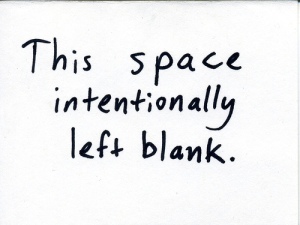There are many pieces to this puzzle. We have too much information to sift through. There are too many people to see, so many meetings to attend, too many e-mails to answer.
We are too busy being busy.
So, the need to focus on one thing is a major, big-time need, and yet is so very hard to pull of.
And, there is a related need – to clear your schedule, and clear your head, and do nothing – more often, regularly, obsessively.
In some recent insights regarding this important truth, I wrote a short while ago about the Jeff Bezos mandated practice of making his leaders sit in silence, together, for the first 30 minutes of his leadership meetings. Each person is reading the same white paper(s), together, making notes in the margins, “thinking.” And only after 30 minutes of such silence together does the conversation start. Granted, it’s not doing “nothing.” But it is doing only one thing together, and doing nothing about all that other stuff vying for room in those very crowded brains in the room.

The latest insight is part of this really good article by Farhad Manjoo: Who Should Run Microsoft Next? Bill Gates. But since he won’t, I have another guy in mind … Mr. Manjoo argues that since Bill Gates won’t re-enter the postion, then Microsoft needs to hire LinkedIn CEO Jeff Weiner.
(Read the Manjoo article for its insight on innovation – and the difficulty of staying innovative. Really good article!)
But, in addition to the terrific insight in the article on innovation, here’s what especially caught my attention. Speaking of Mr. Weiner:
He’s done so by focusing on the long term, even going so far as to schedule 90 minutes a day of doing “nothing” into his calendar in order to force himself to think. That’s exactly the kind of vision Microsoft needs—and, if Gates comes out strongly in favor of this sort of CEO, he might even bring a grand new idea to fruition.
“doing nothing…in order to force himself to think…”
Here’s part of what Mr. Weiner wrote himself (which Manjoo linked to) in his LinkedIn article The Importance of Scheduling Nothing. (I’ve added emphasis in a line or three):
 In aggregate, I schedule between 90 minutes and two hours of these buffers every day (broken down into 30- to 90-minute blocks). It’s a system I developed over the last several years in response to a schedule that was becoming so jammed with back-to-back meetings that I had little time left to process what was going on around me or just think.
In aggregate, I schedule between 90 minutes and two hours of these buffers every day (broken down into 30- to 90-minute blocks). It’s a system I developed over the last several years in response to a schedule that was becoming so jammed with back-to-back meetings that I had little time left to process what was going on around me or just think.
At first, these buffers felt like indulgences. I could have been using the time to catch up on meetings I had pushed out or said “no” to. But over time I realized not only were these breaks important, they were absolutely necessary in order for me to do my job.
Here’s why:
As an organization scales, the role of its leadership needs to evolve and scale along with it. I’ve seen this evolution take place along at least two continuum: from problem solving to coaching and from tactical execution to thinking strategically. What both of these transitions require is time, and lots of it. Endlessly scheduling meeting on top of meeting and your time to get these things right evaporates.
There will always be a need to get things done and knock another To Do item off the list. However, as the company grows larger, as the breadth and depth of your initiatives expand — and as the competitive and technological landscape continues to shift at an accelerating rate — you will require more time than ever before to just think: Think about what the company will look like in three to five years; think about the best way to improve an already popular product or address an unmet customer need; think about how you can widen a competitive advantage or close a competitive gap, etc.
That thinking, if done properly, requires uninterrupted focus; thoroughly developing and questioning assumptions; synthesizing all of the data, information and knowledge that’s incessantly coming your way; connecting dots, bouncing ideas off of trusted colleagues; and iterating through multiple scenarios. In other words, it takes time. And that time will only be available if you carve it out for yourself. Conversely, if you don’t take the time to think proactively you will increasingly find yourself reacting to your environment rather than influencing it. The resulting situation will inevitably require far more time (and meetings) than thinking strategically would have to begin with.
Above all else, the most important reason to schedule buffers is to just catch your breath.
This is a great burst of insight. And, the higher up the food chain you go as a leader, this is crucial work.
And notice this especially – Mr. Weiner does not do this once a month, or once a week. He does this every day! Every day!
Now, if you are not good at this, you will do nothing very poorly. If you are not good at this, you will truly be wasting time. It takes insight, overflow, lots of “input in,” to be able to contextualize, sift through, and focus. In other words, you’ve got to develop a new set of skills to do nothing really well.
But, there may be no other work as important.
——————–
(Personal note: even if you work alone — maybe especially if you work alone — if you work alone, you are the leader of “Me. Inc.,” and you need to schedule such “nothing on my calendar” time, just to think. Regularly – every day).
And, read the post by Bob Morris on our blog: Jeff Weiner on “The Highest ROI Management Tool in Business,” for more insight from Mr. Weiner.
